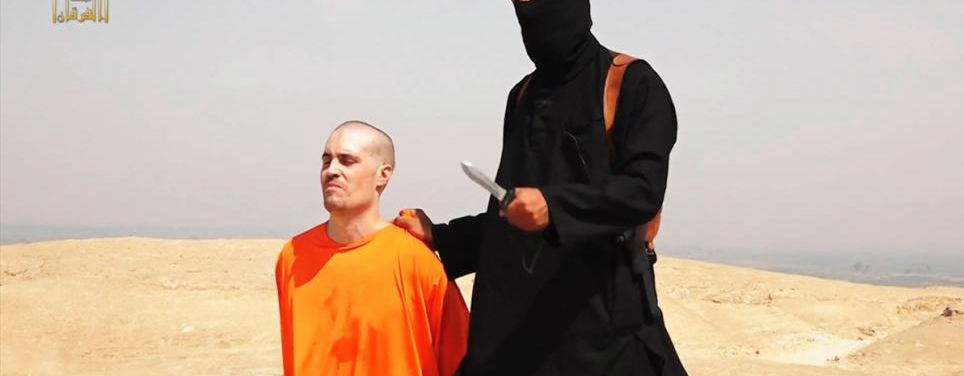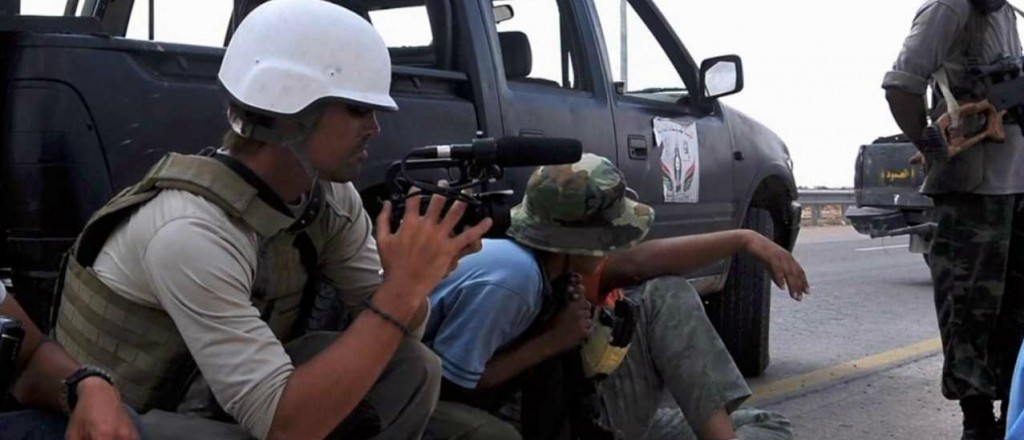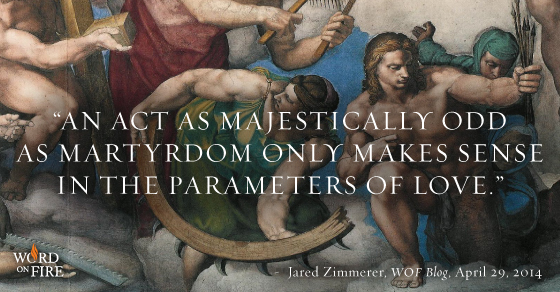Modern Martyrdom – It’s For Real
 James Foley is, seemingly, a saint; a living witness to the faith. He very literally gave his life for the sake of the Kingdom. He was beheaded for being a Christian. From what I can tell, he lived heroic virtue, especially in the face of persecution, even to the point of death. The Catechism of the Catholic Church describes martyrdom as “the supreme witness given to the truth of the faith: it means bearing witness even unto death. The martyr bears witness to Christ who died and rose, to whom he is united by charity. He bears witness to the truth of the faith and of Christian doctrine. He endures death through an act of fortitude.” (CCC 2473.)
James Foley is, seemingly, a saint; a living witness to the faith. He very literally gave his life for the sake of the Kingdom. He was beheaded for being a Christian. From what I can tell, he lived heroic virtue, especially in the face of persecution, even to the point of death. The Catechism of the Catholic Church describes martyrdom as “the supreme witness given to the truth of the faith: it means bearing witness even unto death. The martyr bears witness to Christ who died and rose, to whom he is united by charity. He bears witness to the truth of the faith and of Christian doctrine. He endures death through an act of fortitude.” (CCC 2473.)
James Foley was a journalist working to make the plight of the Syrian people known to the world. They have been oppressed and tortured, and most recently, as I hope we are all aware, have been brutally murdered, often by beheading, by Islamic terrorists. His work put him in terrible situations, and he knew his life was in danger. He was proud of the work he was doing, and knew well the reality of the holy war taking place in the Middle East.
 Jim was a Catholic, and believed firmly in prayer. During his time in the Middle East, he was held captive, and ultimately, was beheaded by the terrorist cell The Islamic State (IS). Their cowardly act of absolute destruction of human life was horrific, while Jim’s witness was absolutely beautiful. He was a TrueMan! In the face of danger, he was courageous. In the face of persecution, he was faithful. In the face of evil, he was true goodness. He lived charity, and gave his life as a witness.
Jim was a Catholic, and believed firmly in prayer. During his time in the Middle East, he was held captive, and ultimately, was beheaded by the terrorist cell The Islamic State (IS). Their cowardly act of absolute destruction of human life was horrific, while Jim’s witness was absolutely beautiful. He was a TrueMan! In the face of danger, he was courageous. In the face of persecution, he was faithful. In the face of evil, he was true goodness. He lived charity, and gave his life as a witness.
In a recounting of his first captivity in Libya in 2011, Jim wrote about how prayer, the Rosary specifically, got him through. He wrote: “If nothing else, prayer was the glue that enabled my freedom, an inner freedom first and later the miracle of being released during a war in which the regime had no real incentive to free us. It didn’t make sense, but faith did.”
Here’s a video showing his parents – talking a little about Jim and his faith.
So the question for us now is, “Do you realize that martyrdom is a real possibility in our world?” I often hear people talking about “those other people” who were martyrd, as if it couldn’t (and won’t) happen to us. I suggest that each man reading this post consider what he will do in the face of oppression, so that when that day comes, he will know and will be prepared. Brothers, we cannot wait to prepare, because the forces of evil are strong, and they are coming for us. Whether it be terror cells like the IS, or some other form of hatred towads Catholics, we will experience persecution, and it may even lead to our death. If you’re living virtuously now, it will make all the difference then. Virtue = authentic masculinity. Virtue = TrueManhood.
TrueMan up!
From Word on Fire Blog – The Attraction of Martyrdom
April 29, 2014 by admin
Filed under Blog, Evangelization, Faith, Scriptural Examples, Virtue
 We’re no strangers to the lore of the martyrs: their sacrifice, their bravery, their unshakable beliefs. But why do it? What is the incentive, the allure? Word on Fire contributor Jared Zimmerer examines the appeal of martyrdom and why it’s not only something we crave but something we can do.
We’re no strangers to the lore of the martyrs: their sacrifice, their bravery, their unshakable beliefs. But why do it? What is the incentive, the allure? Word on Fire contributor Jared Zimmerer examines the appeal of martyrdom and why it’s not only something we crave but something we can do.
Throughout history, men and women have given the ultimate sacrifice for what they believe. Whether that cause is for the good nature of faith, freedom and family or the ever promising yet always short-lived notions of money, grandeur and worldly honor, people tend to find the sacrifice worth the fatal end. The history of the Catholic Faith is riddled with servants of Christ who have endured and glorified some of the worst physical pains known to man. Without knowledge of the good they died for, their sacrifice seems not only vain, but idiotic. However, the transcendent characteristic of their deaths, which can only make sense to those willing to search for it, brands the gruesome scenes worthy of celebration.
One of my favorite paintings, the Last Judgment fresco by Michelangelo seen in the Sistine Chapel, depicts a few of the more popular saints in the way in which they were martyred. There is St. Lawrence with his grate and St. Bartholomew with his knife and flayed skin, St. Andrew with his cross, St. Sebastian holding up the arrows with which he was shot, St. Blaise with his wool combs and St. Catherine with her wheel. These martyrs are put upon pedestals through Church history because mankind recognizes their sacrifice. But could that recognition go further than just human admiration? Could it be perhaps that we were made to “die with our boots on” so to speak?
In the life of Christ, the model of how to live, we find that he was enveloped in his cross the day he was born. An Eternal King born in a smelly cave-like place surrounded by farm animals and hunted by a tyrant, it’s as if the shadow of the cross was already there. We too are born to have crosses. When Christ stated, “Pick up your cross and follow me.” (Matthew 16:24), He didn’t say, “Go find a cross.” He made the statement as if each of us already had one to carry. That cross, the burden of sin, was given to us the day we were born, thus the need for baptism. So, it might feasibly be that we glorify martyrdom because from the minute our soul entered our bodies in our mother’s womb, we were meant to die to self. Whether our martyrdom is red, through the spilling of our blood, or white, through the purity of our lives, it appears that difficulty and hardship is part of being human. “It is part of the discipline of God to make His loved ones perfect through trial and suffering. Only by carrying the Cross can one reach the Resurrection.” – Venerable Fulton Sheen, Life of Christ
It’s interesting that in a society removed from accepting crosses, there has been a resurgence of super-hero movies. In these characters we vicariously experience something that our souls crave. It seems that every single day one or all of my boys are dressing up as Iron Man, Superman or finding some way to turn a Lego into a weapon. At that young of an age, it can only be considered natural. These fictitious heroes don the very spirit of our beloved martyrs and portray the virtuousness of sacrifice on the big screens. What must be realized is that we have a whole slew of super-heroes in the history of man, many of whom can be seen on the ceiling of the Sistine Chapel. One turning point for my own faith was in the study of the martyrs. I wanted what they had. Passion, drive and the willingness to die; it brought back my old childhood dreams of knowing and believing that I was destined to be a hero. So, digging further into the knowledge and writings of our Catholic forefathers I found one trait that gave them those virtues: Love.
We were made by love, to love; therefore an act as majestically odd as martyrdom only makes sense in the parameters of love. If you didn’t love your country, you wouldn’t give your life for her. If you didn’t love your faith, the mere thought of accepting torture before denying Christ would have you running for the hills. Seeing that love is an act of the will, martyrdom is the extreme act of love. A mother willing to wipe up the bathroom after an ‘accident,’ a priest willing to get up in the middle of the night to perform the last rites or hear confessions for hours on end, these are acts of the will, small but highly necessary martyrdoms that helps in the construction of our ladders to heaven.
Without a transcendent cause, martyrdom makes absolutely no sense. If you did not believe in an afterlife that would reward you for your sacrifice there is no point in giving it. Nevertheless, if you believe in something greater than yourself to your very core, then you would sing on the pathway to your death, just as the martyrs of the Roman coliseum did. Such joy, such reverence for death, silences a crowd desiring blood. Admiring the martyrs, desiring to give everything for the spiritual battle, is a grandiose but highly reachable objective. What must be remembered is that many of the red martyrs practiced white martyrdom each and every day. Through the example of our new Pontiff we see how shocked, yet highly intrigued, the world views daily, selfless martyrdom. Perhaps the Church has been blessed with Pope Francis to remind us of the beautiful eccentricity of martyrdom.
“Whoever does not seek the cross of Christ doesn’t seek the glory of Christ.”
— St. John of the Cross
 Jared Zimmerer is an author, husband and father of four from Denton, Texas, whose apostolate, “Strength for the Kingdom,” teaches about the inherent connection between spiritual and physical fitness. Find more of Jared’s work at JaredZimmerer.com.
Jared Zimmerer is an author, husband and father of four from Denton, Texas, whose apostolate, “Strength for the Kingdom,” teaches about the inherent connection between spiritual and physical fitness. Find more of Jared’s work at JaredZimmerer.com.




